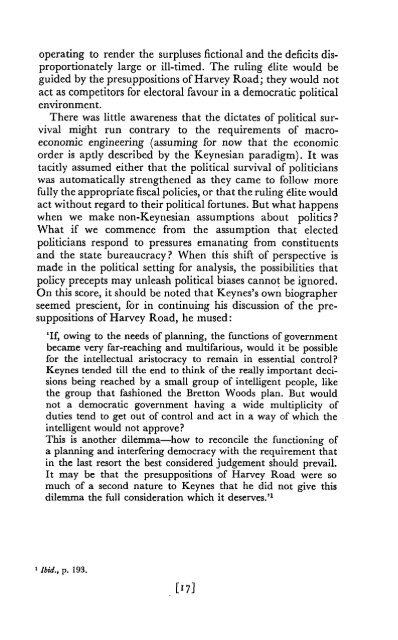THE CONSEQUENCES OF MR KEYNES.pdf - Institute of Economic ...
THE CONSEQUENCES OF MR KEYNES.pdf - Institute of Economic ...
THE CONSEQUENCES OF MR KEYNES.pdf - Institute of Economic ...
Create successful ePaper yourself
Turn your PDF publications into a flip-book with our unique Google optimized e-Paper software.
operating to render the surpluses fictional and the deficits disproportionately<br />
large or ill-timed. The ruling 6lite would be<br />
guided by the presuppositions <strong>of</strong> Harvey Road; they would not<br />
act as competitors for electoral favour in a democratic political<br />
environment.<br />
There was little awareness that the dictates <strong>of</strong> political survival<br />
might run contrary to the requirements <strong>of</strong> macroeconomic<br />
engineering (assuming for now that the economic<br />
order is aptly described by the Keynesian paradigm). It was<br />
tacitly assumed either that the political survival <strong>of</strong> politicians<br />
was automatically strengthened as they came to follow more<br />
fully the appropriate fiscal pohcies, or that the ruling glite would<br />
act without regard to their political fortunes. But what happens<br />
when we make non-Keynesian assumptions about politics?<br />
What if we commence from the assumption that elected<br />
politicians respond to pressures emanating from constituents<br />
and the state bureaucracy ? When this shift <strong>of</strong> perspective is<br />
made in the political setting for analysis, the possibilities that<br />
policy precepts may unleash political biases cannot be ignored.<br />
On this score, it should be noted that Keynes's own biographer<br />
seemed prescient, for in continuing his discussion <strong>of</strong> the presuppositions<br />
<strong>of</strong> Harvey Road, he mused:<br />
'If, owing to the needs <strong>of</strong> planning, the functions <strong>of</strong> government<br />
became very far-reaching and multifarious, would it be possible<br />
for the intellectual aristocracy to remain in essential control?<br />
Keynes tended till the end to think <strong>of</strong> the really important decisions<br />
being reached by a small group <strong>of</strong> intelligent people, like<br />
the group that fashioned the Bretton Woods plan. But would<br />
not a democratic government having a wide multiplicity <strong>of</strong><br />
duties tend to get out <strong>of</strong> control and act in a way <strong>of</strong> which the<br />
intelligent would not approve?<br />
This is another dilemma—how to reconcile the functioning <strong>of</strong><br />
a planning and interfering democracy with the requirement that<br />
in the last resort the best considered judgement should prevail.<br />
It may be that the presuppositions <strong>of</strong> Harvey Road were so<br />
much <strong>of</strong> a second nature to Keynes that he did not give this<br />
dilemma the full consideration which it deserves.' 1<br />
1 Ibid., p. 193.<br />
[17]












